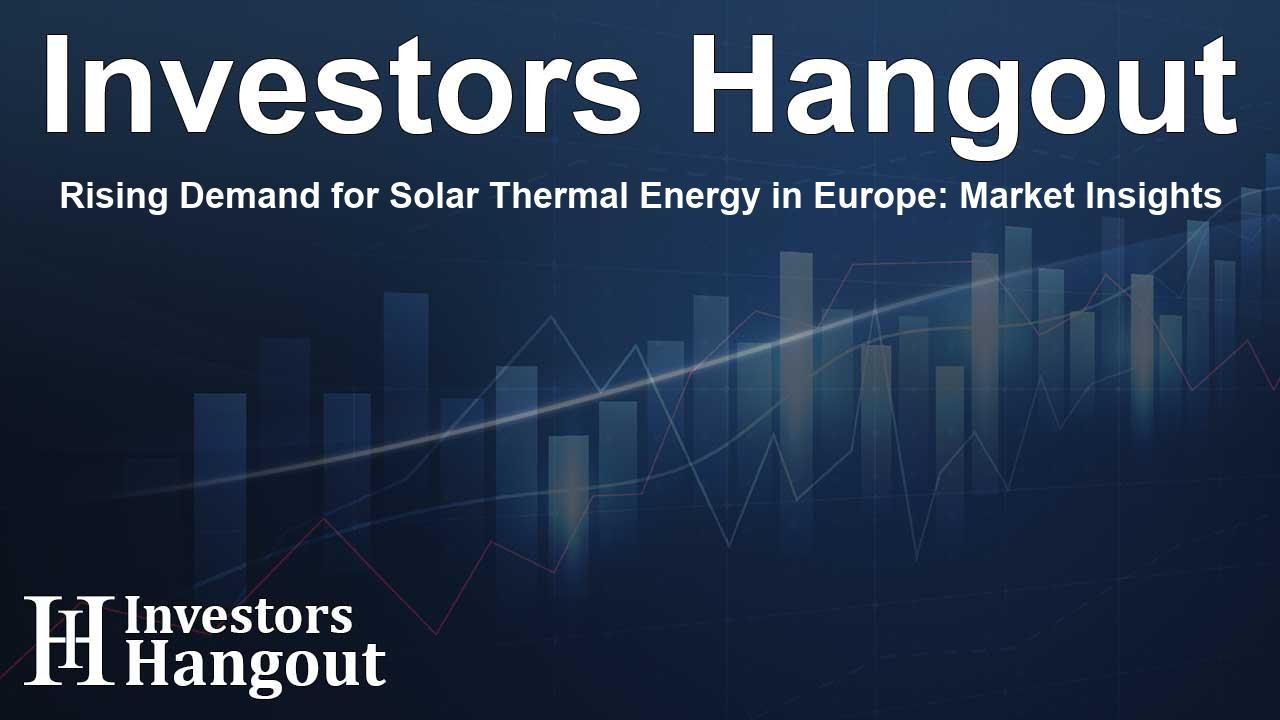Rising Demand for Solar Thermal Energy in Europe: Market Insights

Overview of the Solar Thermal Market in Europe
The solar thermal market in Europe is poised for substantial growth, projecting an increase of USD 1.55 billion from 2025 to 2029. This influx of investment reflects a growing focus on renewable energy and sustainable practices as more industries and governments aim to reduce their carbon footprint. The growth rate anticipates a robust CAGR of approximately 10.2% during this period. As energy costs rise and climate concerns become paramount, solar thermal technology emerges as a promising solution.
Drivers of Market Expansion
The drive towards clean energy solutions is a significant factor propelling the solar thermal market forward. The industrial sector, in particular, is increasingly adopting solar energy for various processes, including manufacturing and heating applications. Solar thermal systems utilize the sun's energy to heat water, providing a sustainable alternative to fossil fuels. This shift not only aids businesses in meeting their energy needs efficiently but also aligns with global environmental goals.
Applications of Solar Thermal Technology
Solar thermal technology serves a multitude of applications, from industrial heating to power generation. Key sectors such as automotive manufacturing, textiles, and food processing rely on these systems to enhance energy efficiency. For instance, solar heaters and thermal energy storage systems are utilized to support peak load conditions, significantly reducing dependency on conventional energy sources.
Technological Innovations
The evolution of solar thermal technologies has introduced a variety of innovative systems. Concentrating solar power (CSP) plants and photovoltaic solar panels play a crucial role in harnessing thermal energy. Additionally, advancements in infrared insulating materials and thermosiphoning systems improve the overall efficiency and effectiveness of these technologies, making them more appealing to potential investors.
Challenges in the Solar Thermal Market
Despite the benefits, several challenges threaten the solar thermal market's growth trajectory. In regions where seawater and mineral content are prevalent, the efficiency of solar thermal power generation can be severely impacted. The availability of freshwater is critical for operations, particularly in desalination applications. Moreover, regulatory frameworks and greenhouse gas emissions continue to pose challenges, hindering widespread adoption.
Market Dynamics and Competitive Landscape
The competitive environment in the solar thermal sector is markedly fragmented, featuring numerous vendors vying for market share. Companies such as Aalborg CSP, Acciona, and Robert Bosch are among the major players investing heavily to develop innovative solutions and foster strategic partnerships. The fierce competition drives continuous improvement, ensuring that solar thermal systems remain at the forefront of the renewable energy landscape.
Future Trends in Solar Thermal Energy
Looking ahead, the solar thermal market in Europe is anticipated to evolve with emerging trends in consumer behavior and technological adoption. There's an increasing emphasis on optimizing energy storage solutions and enhancing system integration, which will contribute to improved efficiency and reliability. Stakeholders across various sectors are encouraged to adapt their strategies to harness the full potential of solar thermal energy.
Conclusion
The future of the solar thermal market in Europe appears bright, buoyed by a growing emphasis on sustainability and energy efficiency. As technology advances and investment flows into this sector, it holds great potential for meeting the energy demands of a changing world. Continued focus on overcoming existing challenges will be critical to realizing the full potential of solar thermal systems in the energy landscape.
Frequently Asked Questions
What factors are driving the growth of the solar thermal market in Europe?
The increasing adoption of solar energy in various industries, along with rising energy costs and governmental support for renewable energy, are key drivers of market growth.
What are the main applications of solar thermal technology?
Solar thermal technology is used for industrial heating, power generation, water desalination, and other applications that require thermal energy.
What challenges does the solar thermal market face?
Challenges include the need for fresh water in operations, regulatory hurdles, and emissions concerns that may impact growth.
Who are the key players in the solar thermal market?
Major players include Aalborg CSP, Acciona, Robert Bosch, and others who are leading advancements in solar thermal technologies.
What is the forecast for the solar thermal market in Europe?
The market is expected to grow by USD 1.55 billion from 2025 to 2029, with a CAGR of approximately 10.2% during this period.
About The Author
Contact Hannah Lewis privately here. Or send an email with ATTN: Hannah Lewis as the subject to contact@investorshangout.com.
About Investors Hangout
Investors Hangout is a leading online stock forum for financial discussion and learning, offering a wide range of free tools and resources. It draws in traders of all levels, who exchange market knowledge, investigate trading tactics, and keep an eye on industry developments in real time. Featuring financial articles, stock message boards, quotes, charts, company profiles, and live news updates. Through cooperative learning and a wealth of informational resources, it helps users from novices creating their first portfolios to experts honing their techniques. Join Investors Hangout today: https://investorshangout.com/
The content of this article is based on factual, publicly available information and does not represent legal, financial, or investment advice. Investors Hangout does not offer financial advice, and the author is not a licensed financial advisor. Consult a qualified advisor before making any financial or investment decisions based on this article. This article should not be considered advice to purchase, sell, or hold any securities or other investments. If any of the material provided here is inaccurate, please contact us for corrections.
